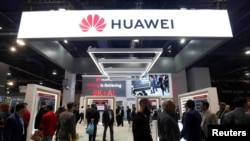The United States and China are seeking to be the world’s leader in artificial intelligence, or AI, and other fast-developing technologies.
But this high-tech competition has been affected by U.S. concerns about some Chinese investments in American businesses.
For years, cooperation has grown between China and California’s Silicon Valley, home to many of the world’s top technology companies. But the current U.S. administration has increased scrutiny of Chinese investments in Silicon Valley. This has caused some U.S. startups to turn down Chinese investments.
Michael Wessel heads the U.S.-China Economic and Security Review Commission. The U.S. government organization investigates whether U.S.-China economic and trade relations are affecting U.S. national security.
Wessel recently told a Congressional hearing that China is currently very active in many areas of technology innovation. “China wants to be a global innovation leader and is doing all that it can legally and illegally to achieve its goals,” he said.
The U.S. has accused China of carrying out cyberattacks on U.S. businesses in an effort to steal company secrets. U.S. officials have also raised concerns about rules that require American companies to turn over their technology to Chinese partners.
The issues have also complicated ongoing trade talks between the U.S. and China.
Accusations against Huawei
One major company facing U.S. accusations is Chinese technology company Huawei. The company’s chief financial officer, Meng Wanzhou, faces fraud charges in the United States. Meng is being held in Canada after being arrested in December, and U.S. officials are seeking to bring her back to the U.S. to face the charges.
U.S. government lawyers have said Huawei violated U.S. restrictions against sales to Iran. In addition, they accuse the company of stealing trade secrets from technology company T-Mobile.
Huawei is currently working on building 5G systems – the next generation in wireless technology - in countries around the world. The 5G development has caused tensions between the U.S. and China. U.S. officials have long suspected the Chinese government could use Huawei network equipment to help carry out spying activities. Huawei has rejected such accusations.
U.S. restrictions
The U.S. government has urged American companies not to use Chinese technology in its communications systems because of security concerns. It has also pressed other countries to ban Huawei from building 5G networks.
U.S. officials want to put restrictions on several kinds of technology – including AI and robotics - because it sees them as possible threats to national security.
But many in the tech industry say such restrictions could end up harming U.S. businesses. Tim Draper operates a major investment company in Silicon Valley. He told VOA he was one of the first U.S. investors in Chinese technology company Baidu.
“I think we should be open and sharing,” Draper said. “Both countries benefit so much by having a very open communication lane. I believe we have a problem that we are putting up barriers where they don’t benefit us.”
It remains unclear how long the current investment environment will last in Silicon Valley. But for now, it seems many investors and startup companies have accepted a cooling off period for Chinese-related investments.
I’m Bryan Lynn.
Michelle Quinn reported this story for VOA News. Bryan Lynn adapted her story for Learning English. Hai Do was the editor.
We want to hear from you. Write to us in the Comments section, and visit our Facebook page.
________________________________________________________________
Words in This Story
artificial intelligence – n. the ability of a machine to use and analyze data in an attempt to reproduce human behavior
scrutiny – n. careful examination of something
innovation – n. a new idea or method that is being tried for the first time, or the use of such ideas or methods
achieve – v. to succeed in doing something good
complicate – v. make something more difficult
benefit – v. something that helps you or gives an advantage
lane – n. a route regularly used by vehicles, boats, etc.







